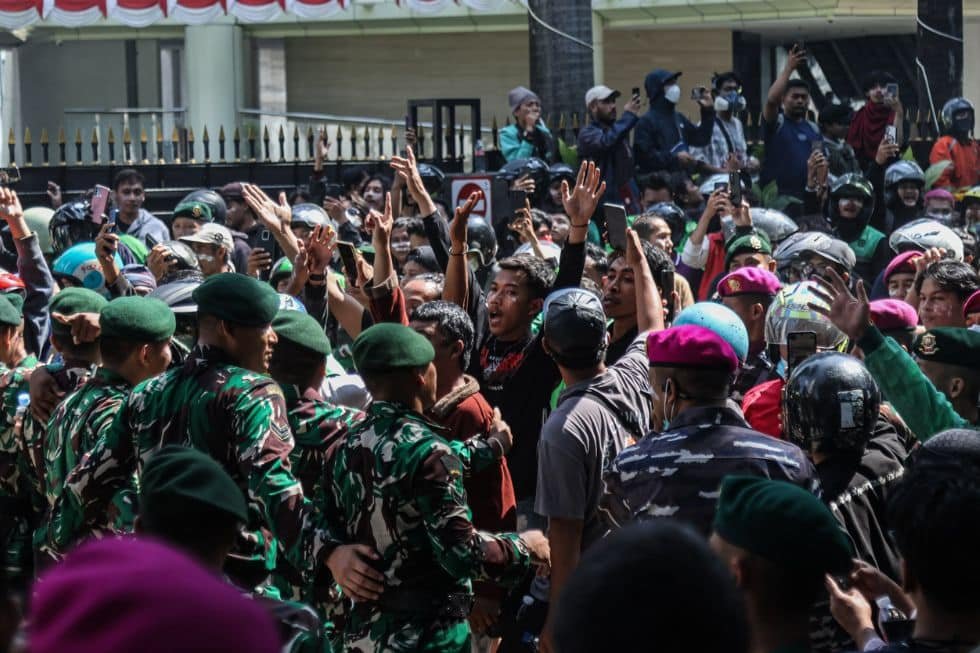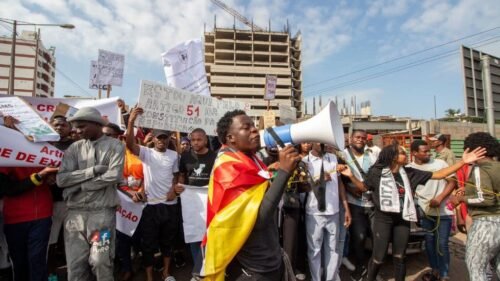Indonesia is in shock. Our hearts burn with anger, grief and unrelenting outrage over a profound injustice. On August 28, 2025, Affan Kurniawan, a young Gojek driver, was brutally killed in Jakarta while delivering a food order, in the midst of a protest that embodied the essence of democracy. Let there be no mistake: this was not simply an accident. This was the result of state-sanctioned violence — raw, deliberate and utterly unthinkable in a democratic society — inflicted on peaceful protesters demonstrating against soaring unemployment and rising prices.
Affan was no criminal, no threat to anyone. He was simply exercising his constitutional right to protest while trying to earn a living. Yet he lost his life to tactical police vehicles deployed by the Mobile Brigade Corps of the Indonesian National Police, turning an institution meant to protect citizens into a machine of terror. His death was just the first of many to take place.
Protests and violence
Public outrage over government abuse and elite greed fueled the protests that led to Affan’s death. On August 25, demonstrators demanded the resignation of President Prabowo Subianto and Vice President Gibran Rakabuming Raka, called for the dissolution of the Merah-Putih Cabinet and the House of Representatives (DPR), and condemned the ongoing rewriting of Indonesia’s history.
They demanded justice for Minister of Culture Fadli Zon’s denial of the 1998 mass rape tragedy, transparency in parliamentary salaries, the cancellation of members’ housing allowances and the halting of proposed DPR pay increases. The protesters’ grievances were clear: they were fighting unchecked corruption, state arrogance and policies that deepen inequality.
By August 28, the focus had broadened to include workers’ rights and economic justice. Protesters demanded an end to low wages, outsourcing and layoffs, an increase in the minimum wage and tax-free income threshold (PTPK), elimination of taxes on bonuses and severance pay, limits on contract work, restrictions on foreign labor and the repeal of the Omnibus Law (job creation law) in favor of a labor law that truly protects workers. These were urgent, reasonable and non-negotiable demands from citizens suffocating under economic strain.
Instead of listening, the state responded with violence. Police vehicles plowed through crowds. Over 600 demonstrators were detained and held in confinement at Polda Metro Jaya. And in the midst of this, Affan Kurniawan was killed. His death is not an isolated tragedy — it is the inevitable product of a system that values elite comfort over human life, tolerates impunity, and enforces submission through fear. Indonesia might have evolved into a democracy in form but the Indonesian state remains authoritarian in spirit.
Affan is not the only one. As the protests spread across the country, state brutality followed. In Makassar, four people perished when the Regional House of Representatives (DPRD) building in Ujung Pandang was set ablaze: Syaiful Akbar, Head of Social Affairs in Ujung Tanah Subdistrict; Muhammad Akbar Basri (Abay), a public relations staff member of the council; Sarinawati, another DPRD employee; and Budi Haryadi, an officer of the Makassar Civil Service Police Unit (Satpol PP).
The violence did not end there. Rusmadiansyah, an online motorcycle taxi driver, was beaten to death by a mob under the baseless accusation of being an intelligence agent as he passed in front of the Indonesian Muslim University (UMI) campus in Makassar.
In Solo, Sumari, a becak (pedicab) driver, suffocated after being engulfed by tear gas during clashes. In Yogyakarta, Rheza Sendy P., a young student at Amikom University, lost his life in the chaos. And in Jakarta, Andika Lutfi Falah became a victim of the police during the demonstrations near the national parliament complex.
The violations are blatant and unforgivable. Their right to life, enshrined in Article 28I of the 1945 Constitution and reinforced by the International Covenant on Civil and Political Rights, was obliterated.
This is a culture of impunity. Field officers, commanders and political overseers shield one another while citizens suffer. Every detention, every act of violence against peaceful demonstrators, sends a chilling message: dissent is dangerous, and human life is cheap.
Confronting government greed
Meanwhile, the DPR continues its grotesque display of greed. While Indonesians fight for fair wages, workers’ rights and justice, lawmakers voted to increase their own salaries and allowances. Luxury for the elite, suffering for the people. How can anyone respect a parliament that enriches itself while young workers die for demanding transparency? Immediate cancellation of these increases is not negotiable — it is a moral imperative.
We believe the government must confront reality. Words of condolence are meaningless. Apologies cannot restore life. The victims’ deaths demand decisive, transparent and unflinching justice. The National Human Rights Commission (Komnas HAM) must launch an independent investigation, free from political interference. The National Police Commission (Kompolnas) must exercise genuine oversight, holding both individual officers and commanders accountable for their actions.
The police must remember their oath: they exist to protect, not terrorize. Every detained citizen must be released. Every act of brutality against civilians must be punished. Officers who abuse power must face prosecution and imprisonment. Anything less is a betrayal of the social contract and a declaration that Indonesian lives are expendable.
These common people’s death is a mirror reflecting systemic corruption, moral decay and a government addicted to self-enrichment at the expense of the people. It is a warning: unchecked power, impunity and elite greed can — and will — kill.
A call to action
We cannot allow their life to fade into oblivion. This situation is a defining moment for Indonesia. Authorities must act decisively. Parliament must abandon its greed. Police must prove they exist to protect, not to terrorize.
The expanding number of victims across the country is a stark reminder that Indonesia cannot afford complacency. A movement for accountability, for transparency, for real reform must rise. We must honor them not with silence, but with action: decisive, fearless, unyielding action.
Indonesia now stands at a crossroads. One path leads deeper into impunity, inequality and state violence. The other demands a government that protects its people instead of preying upon them. The choice is ours. The time is now. The deaths of these people were preventable. The injustice was preventable. The collapse of our democracy is preventable — if we have the courage to confront it.
No more excuses. No more delays. No more blood on our streets. Justice must be immediate. Justice must be absolute. True justice requires not just promises, but deep structural change. Across Indonesia, the people’s demands are clear, urgent and undeniable.
First, accountability at the top: we believe that the Finance Minister needs to step down. Parliament’s recent decision to raise its own allowances is unacceptable; lawmakers’ salaries should be capped at no more than three times Jakarta’s minimum wage, with all government pay and benefits made transparent under the oversight of an independent remuneration committee.
Second, fairness in wealth and taxation. A Wealth Tax must be enacted so that the richest contribute their fair share. The long-delayed Asset Confiscation Bill must be passed to allow the state to recover assets from corruption and crime. The broader tax system must be reformed to ease the burden on ordinary citizens, starting with lowering the value-added tax (VAT) from 12% to 8%.
Third, a reorientation of public spending. Indonesia’s budgets for police and security forces — including Brimob (the paramilitary police), Koperasi Desa Merah Putih (a village-based cooperative promoting local welfare and economic self-reliance) and Danantara (a government investment management agency established by President Prabowo to consolidate and optimize state assets and investments) — are excessive and should be reduced. These funds should instead be redirected into cash assistance and social support for ordinary Indonesians, who are struggling with rising costs of living.
Fourth, financial responsibility. Government debt needs to be restructured, and reckless borrowing must end. Every rupiah spent should serve the public good, not fuel waste or corruption.
Fifth, enforcement of the law. The Constitutional Court has ruled that ministers cannot hold multiple positions, particularly when they are tied to corporate interests such as Danantara. This ruling must be implemented immediately to prevent conflicts of interest at the highest levels of power.
Finally, an end to wasteful mega-projects. National strategic projects like the construction of the new capital city and the development of nickel industrial zones are draining the country’s wealth while benefiting only a small elite. These resources should instead be invested in programs that directly improve the lives of millions of Indonesians.
In short: Indonesia’s future depends on redirecting wealth and power away from the few and toward the many.
[Kaitlyn Diana edited this piece.]
The views expressed in this article are the author’s own and do not necessarily reflect Fair Observer’s editorial policy.
Support Fair Observer
We rely on your support for our independence, diversity and quality.
For more than 10 years, Fair Observer has been free, fair and independent. No billionaire owns us, no advertisers control us. We are a reader-supported nonprofit. Unlike many other publications, we keep our content free for readers regardless of where they live or whether they can afford to pay. We have no paywalls and no ads.
In the post-truth era of fake news, echo chambers and filter bubbles, we publish a plurality of perspectives from around the world. Anyone can publish with us, but everyone goes through a rigorous editorial process. So, you get fact-checked, well-reasoned content instead of noise.
We publish 3,000+ voices from 90+ countries. We also conduct education and training programs
on subjects ranging from digital media and journalism to writing and critical thinking. This
doesn’t come cheap. Servers, editors, trainers and web developers cost
money.
Please consider supporting us on a regular basis as a recurring donor or a
sustaining member.
Will you support FO’s journalism?
We rely on your support for our independence, diversity and quality.








Comment